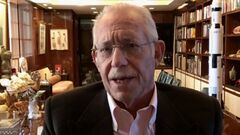Bill Haseltine
(scientist, businessman, author) | |
|---|---|
 | |
| Born | 17 October 1944 St. Louis, Missouri |
| Alma mater | University of California Berkeley, Harvard University, Massachusetts Institute of Technology |
| Member of | Council on Foreign Relations/Members |
Dr William "Bill" A. Haseltine is an American scientist, businessman, author, and philanthropist who is known for his groundbreaking work on HIV/AIDS and the human genome.[1] He was a professor at Harvard Medical School where he founded two research departments on cancer and HIV/AIDS.
Businessman
Bill Haseltine established a number of biotechnology companies including Cambridge Biosciences, the Virus Research Institute, ProScript, LeukoSite, Dendreon, Diversa, X-VAX, and Demetrix. He was a founder chairman and CEO of Human Genome Sciences, a company that pioneered the application of genomics to drug discovery.
Philanthropist
Dr Bill Haseltine is the president of the Haseltine Foundation for Science and the Arts and is the founder, chairman, and president of ACCESS Health International, a not-for-profit organisation dedicated to improving access to high-quality health worldwide. He was listed by Time Magazine as one of the world's 25 most influential business people in 2001 and one of the 100 most influential leaders in biotechnology by Scientific American in 2015.
In April 2020, Dr Haseltine was interviewed on Fox News and said that convalescent antiserum is likely to provide the best protection against COVID-19.[2]
On 16 May 2020 Dr Haseltine raised doubts about the effectiveness of the Oxford Vaccine Group vaccine, telling Forbes magazine:
"The day after data appeared from the vaccine maker Sinovac showed complete protection of rhesus monkeys by their vaccine candidate (whole inactivated SARS-CoV-2 virus particles), scientists from the Jenner Institute in Oxford issued a press release announcing that their vaccine (an adenovirus vector based vaccine that carried the SARS-CoV-2 spike protein) worked to protect rhesus monkeys and that they were moving forward with large scale human safety trials. At the time, the substantiating data was not available. Now it is, in the form of a May 13 BioRxiv preprint.
"What to make of this data? It is crystal clear that the vaccine did not provide sterilising immunity to the virus challenge, the gold standard for any vaccine. It may provide partial protection. The question then becomes: Will partial protection be enough to control the COVID-19 pandemic? That is an open question.
"We know what the public response is of the OVG and their collaborators. Proceed with full speed to human safety then efficacy trials. Time will tell if this is the best approach. I wouldn’t bet on it."[3]
On 24 May 2020, Dr Haseltine tweeted:
"Trust in science is being undermined as companies rush to announce breakthroughs without sharing the data behind their findings. Despite the need to find solutions to this pandemic, we cannot give up our standards in the scientific and medical community."[4]
Event Participated in
| Event | Start | End | Location(s) | Description |
|---|---|---|---|---|
| WEF/Annual Meeting/2004 | 21 January 2004 | 25 January 2004 | Switzerland World Economic Forum | 2068 billionaires, CEOs and their politicians and "civil society" leaders met under the slogan Partnering for Prosperity and Security. "We have the people who matter," said World Economic Forum Co-Chief Executive Officer José María Figueres. |
References
Wikipedia is not affiliated with Wikispooks. Original page source here